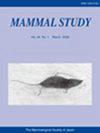Long-Tailed Macaque Reliance on Anthropogenic Food with Potential Conflicts toward Humans in the Campus of Universiti Malaysia Sabah
IF 0.8
4区 生物学
Q3 ZOOLOGY
引用次数: 0
Abstract
Human-macaque interactions and conflicts were examined at the main campus of Universiti Malaysia Sabah (UMS). The study observed the behavior of long-tailed macaques (Macaca fascicularis) and their dependence on both natural and anthropogenic food sources. Results revealed that the macaques' diet primarily consisted of young leaves (40.6%) from the natural environment within the UMS campus, but anthropogenic food discarded by students in garbage cans (27.6%) also contributed a major component in their diet. The availability of anthropogenic food positively correlated with the macaques' consumption, indicating that they consumed more of such foods when they were more abundant, particularly during the semesters when students were present. A questionnaire survey further highlighted that while the presence of macaques on the UMS campus was not considered a major concern, it still posed a problem that necessitated immediate attention. The main driving factor behind these interactions, as perceived by the students, was the macaques accessing anthropogenic food waste in garbage cans located in human-dominated spaces. To mitigate conflicts, it is suggested to implement macaque-proof garbage cans, reduce the amount of leftover anthropogenic food, and improve waste management practices. Additionally, educational activities should be considered to discourage direct feeding of macaques by students.马来西亚沙巴大学校园的长尾猕猴对人类食物的依赖及其与人类的潜在冲突
在马来西亚沙巴大学(UMS)主校区,研究了人类与猕猴的互动和冲突。本研究观察了长尾猕猴(Macaca fascicularis)的行为及其对自然和人为食物来源的依赖。结果显示,猕猴的饮食主要由来自UMS校园内自然环境的嫩叶(40.6%)组成,但学生丢弃在垃圾桶中的人为食物(27.6%)也是其饮食的主要组成部分。人造食物的可得性与猕猴的消费呈正相关,这表明当食物更充足时,它们会消耗更多的此类食物,尤其是在有学生在场的学期。一项问卷调查进一步强调,虽然猕猴在UMS校园的存在并没有被认为是一个主要问题,但它仍然构成了一个需要立即关注的问题。学生们认为,这些互动背后的主要驱动因素是,猕猴在人类主导的空间里捡垃圾桶里的人为食物垃圾。为了缓解冲突,建议实施防猕猴垃圾桶,减少人为食物的剩余量,改善废物管理实践。此外,应考虑开展教育活动,阻止学生直接喂食猕猴。
本文章由计算机程序翻译,如有差异,请以英文原文为准。
求助全文
约1分钟内获得全文
求助全文
来源期刊

Mammal Study
ZOOLOGY-
CiteScore
1.70
自引率
20.00%
发文量
23
审稿时长
>12 weeks
期刊介绍:
Mammal Study is the official journal of the Mammal Society of Japan. It publishes original articles, short communications, and reviews on all aspects of mammalogy quarterly, written in English.
 求助内容:
求助内容: 应助结果提醒方式:
应助结果提醒方式:


